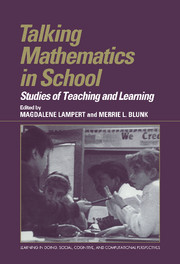Book contents
- Frontmatter
- Contents
- Series Foreword
- Acknowledgments
- List of Contributors
- 1 Introduction
- Part I Doing and Learning Mathematical Talk
- Part II Teaching Mathematical Talk
- 6 Investigating Teaching Practice
- 7 The Teacher's Role in Mathematical Conversation: Stepping In and Stepping Out
- 8 Teacher Talk About How to Talk in Small Groups
- 9 Teaching and Learning Politeness for Mathematical Argument in School
- Afterword
- Author Index
- Subject Index
9 - Teaching and Learning Politeness for Mathematical Argument in School
Published online by Cambridge University Press: 04 August 2010
- Frontmatter
- Contents
- Series Foreword
- Acknowledgments
- List of Contributors
- 1 Introduction
- Part I Doing and Learning Mathematical Talk
- Part II Teaching Mathematical Talk
- 6 Investigating Teaching Practice
- 7 The Teacher's Role in Mathematical Conversation: Stepping In and Stepping Out
- 8 Teacher Talk About How to Talk in Small Groups
- 9 Teaching and Learning Politeness for Mathematical Argument in School
- Afterword
- Author Index
- Subject Index
Summary
If you disagree, like Anthony just disagreed with Eddie, that's very very important to do in math class. But when you disagree, or think somebody misspoke, you need to raise your hand and say, I think he must have meant plus not times. And then Eddie will probably revise, even before you get it out of your mouth… So one thing we have here is, how to challenge or disagree with somebody in your class. And that's a very important thing, mathematicians do it all the time. But you have to have a good reason, and you have to do it with politeness.
–Magdalene Lampert on September 11, 1989, to her fifth-grade mathematics classConfronted by a stark contrast between the expert and novice views of the work of academic disciplines and projections of the diminished stature of the United States in the global economic arena, reformers of U.S. mathematics education have begun to call for classroom discourse to more closely resemble the professional discourse of mathematicians. Contemporary reformers have a dual objective in their focus on discourse: Discourse is valued both as a learning activity and as a means of “practicing” an academic discipline. More specifically, in its Professional Standards for Teaching Mathematics, the National Council of Teachers of Mathematics maintains that discourse in which all students reason and argue about mathematical meanings should become a classroom norm.
- Type
- Chapter
- Information
- Talking Mathematics in SchoolStudies of Teaching and Learning, pp. 213 - 238Publisher: Cambridge University PressPrint publication year: 1998
- 6
- Cited by

